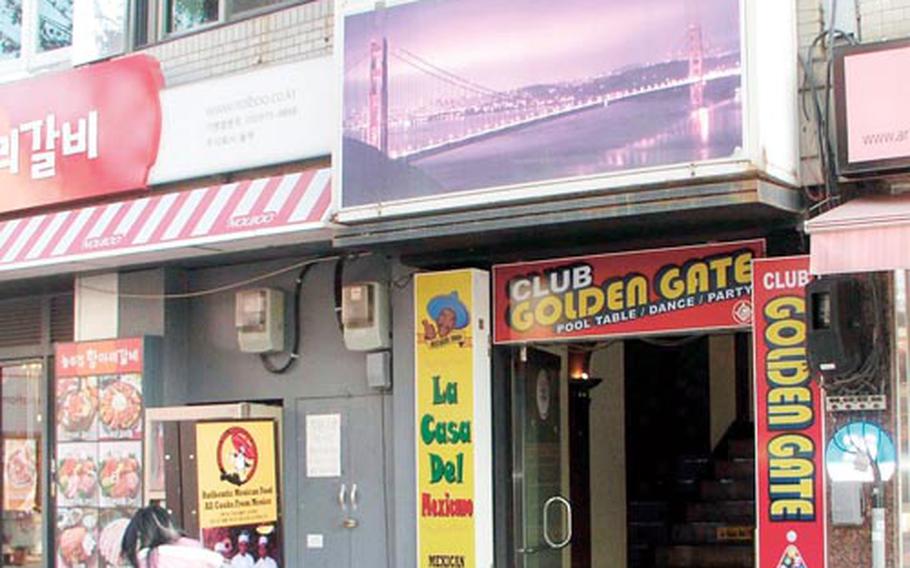
This is the Golden Gate club Wednesday, in the Songtan entertainment district outside Osan Air Base in Pyeongtaek, South Korea. Base officials have told the owner of the Golden Gate and three other local clubs that the establishments could be declared off limits to U.S. servicemembers over allegations that they’d been venues for bar-fining. (Franklin Fisher/Stars and Stripes)
PREVIOUS STORY:South Korean ‘juicy bar’ owners hear Army’s concerns
OSAN AIR BASE, South Korea — Base officials Friday slapped an off-limits ban on four off-base "juicy bars" they say allowed U.S. servicemembers to pay to take bar girls off the premises, an activity known as bar fining.
The same four clubs — Stardust, Sting, Golden Gate and UN — were among eight put off-limits by Osan in late 2008 and early 2009, also for bar fining. The four are in the Shinjang Mall commercial district — a tightly clustered warren of bars, restaurants and small shops — that lies just outside Osan’s main gate, in the Songtan section of Pyeongtaek.
Bar fining is typically associated with prostitution and human trafficking. When they are contracted to bars, however, the Filipinas are given juice sales quotas they must meet, and if they fail many are often forced to prostitute themselves to pay a bar fine to their employer to make up the difference.
First Lt. Chris Hoyler, a spokesman for the 51st Fighter Wing at Osan, said that while the latest case is pending he could not disclose further specifics, including whether the bar fining had involved sexual activity.
He said one airman confessed to bar fining, and several other airmen told investigators the clubs in question "encouraged and profited" from the practice.
The Osan off-limits order comes after Army officials at Camp Casey, north of Seoul, recently placed two juicy bars off-limits due to prostitution. According to U.S. Forces Korea’s Web site, 64 bars and other establishments near military installations around the peninsula have been declared off-limits due to prostitution and human trafficking activities.
But despite frequent incidents of bar fining and the U.S. military’s stated "zero-tolerance" for activities associated with prostitution and human trafficking, U.S. Forces Korea said Friday it has no plans for a blanket ban on juicy bars outside military installations.
"In this case we believe our policies are sufficient and no change is being considered at this time," according to an e-mail from a USFK spokeswoman, Rita McIntosh, who said the statement had been authorized by USFK public affairs officer Col. Jane Crichton.
Bar fining is common in many juicy bars, largely staffed by women brought from the Philippines. The women flirt and chat with customers to get them to buy expensive juice drinks.
A Stars and Stripes probe of juicy bar practices in September found that promoters bring the Filipinas to South Korea on the pretext that they would work as singers and entertainers.
Friday’s ban also comes at a time when the Philippine government has begun to take a harder line to curtail employment of Filipinas in South Korea’s juicy bars. Philippine authorities on Tuesday told Stars and Stripes they’ve stopped approving requests from promoters who want authorization for Filipinas to work in juicy bars near U.S. military installations or in South Koean seaports.
The latest ban against the four Osan-area clubs was imposed by Air Force Col. Mark Mattison, vice commander of Osan’s 51st Fighter Wing.
Wing officials said Air Force law enforcement officials documented instances of bar fining at the four clubs from October to December. Their probe was triggered after an airman confessed to engaging in bar fining at one of the clubs, said Capt. Matthew L. Stines, the wing’s chief spokesman.
The airman — a staff sergeant — was punished with restriction to base, extra duty, loss of pay and a reduction in rank that was suspended, said Tech. Sgt. Sheri Kangas, a wing spokeswoman.
The club owners met Jan. 29 at Osan with the wing’s Armed Forces Disciplinary Control Board, who discussed the bar-fining allegations and told the owners they faced the possibility of having their clubs put off-limits.
The owners on Wednesday told Stars and Stripes they were weighing what response they’d make to base officials. None of the owners could be immediately reached for comment Friday after Mattison placed their bars off-limits.
Previously, the four clubs were among eight that then-wing commander Col. Thomas H. Deale put off-limits in November and December 2008 and January 2009 after Air Force police turned up evidence of bar fining. Deale lifted the ban in February 2009 after the eight owners promised to keep their clubs free of bar fining, barroom violence and underage drinking.